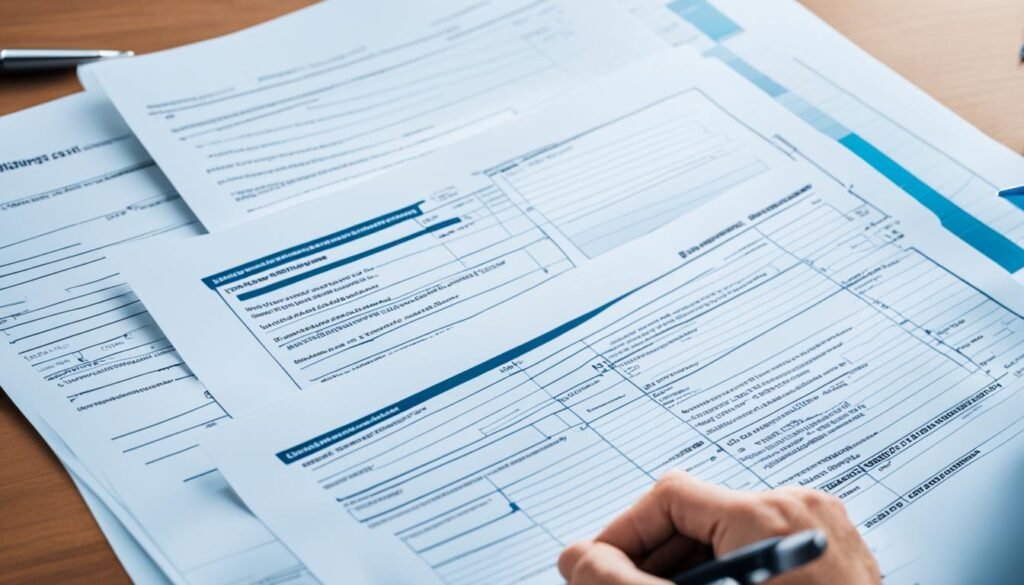A recent study found that Americans spend about 20 hours a year dealing with insurance claims1. This shows how important it is to know how to handle insurance companies. Whether you’re filing a claim, appealing a decision, or just trying to understand your policy, the right steps can help a lot.
This guide will give you many important tips and strategies for dealing with insurance. You’ll learn how to understand your policy and document all your talks with insurance companies. This way, you can get the most from your coverage and avoid the stress of dealing with insurance.
Key Takeaways
- Gather essential documents like insurance policy number, Medicare Summary Notice (MSN), Explanation of Benefits (EOB), and bills before contacting insurance companies1.
- Record details of every conversation with insurance representatives, including their name, extension, date, time, and next steps1.
- Be aware of deadlines for submitting information, especially for appeals of care denials1.
- Prepare for potential hold times and automated phone systems when communicating with insurers1.
- Understand the varying levels of authority within insurance companies to effectively escalate issues2.
Understanding Your Insurance Policy
Before you deal with an insurance company, it’s key to know your insurance policy well. This part talks about the main policy terms and definitions you should grasp. It also highlights why it’s vital to understand your policy’s coverage limits and exclusions.
Key Policy Terms and Definitions
Insurance policies can be tricky, filled with terms and definitions you need to get. For instance, indemnity contracts are common, where insurers pay the actual loss suffered3. But, many people insure for less than what their property is worth, leading to not enough coverage3. Excess policies help avoid small claims, and insurers set limits on when they pay3. Deductibles are common too, with higher ones meaning lower premiums and vice versa3.
Non-indemnity contracts, like those for life insurance and personal accident insurance, cover losses that can’t be measured in money3. The idea of insurable interest is key, making sure people have a financial reason to insure something3.
Coverage Limits and Exclusions
It’s crucial to know your policy’s coverage limits and exclusions. The Declaration Page shows who’s insured, what’s covered, policy limits, and when the policy is active4. The Insuring Agreement details what’s covered, with options like Named-perils and All-risk coverage4. But, Exclusions can remove coverage from the Insuring Agreement, including certain perils, losses, and property4.
The Conditions part of the policy explains what must be met for the insurer to pay. If these conditions aren’t met, the insurer can deny claims4. Reading all Endorsements or Riders is key to know any changes to the policy and make sure it fits your needs4.

Knowing the main policy terms, definitions, coverage limits, and exclusions helps you navigate your insurance policy better. This ensures you get the coverage you need34.
Documenting Every Communication
When dealing with insurance companies, clear communication and keeping records are key. It’s vital to keep a detailed log of all talks, like phone calls, emails, and letters. This way, you have proof of everything the insurance company says or promises, helping your claims.
Maintaining a Detailed Record
Be thorough when talking to your insurance company. Write down the date, time, and who you talked to, along with a brief summary of what was said and any promises made.5 Save all emails, letters, and other documents. Organize them so you can find them easily when you need to6.
Creating a Paper Trail
It’s also crucial to build a paper trail. This means sending letters and emails that explain your claims and any issues you’re facing.6 Keep copies of everything you send and any replies you get from the insurance company7.
By carefully documenting your talks and keeping a detailed paper trail, you boost your chances of a successful insurance claim567.

Tips for Communicating with Insurance Companies
Talking to insurance companies can be tough. To make it easier, use the right words and manners. Also, be active and keep following up8.
Using Proper Language and Etiquette
When you talk to insurance reps, be nice, quick, and professional. A study found 85% of customers want to be treated well by these reps9. Also, 70% like to have their questions answered clearly9. Being kind and helpful makes things go better.
Being Proactive and Persistent
Dealing with insurance can be hard, but don’t give up. In healthcare, 60% of people think it’s key to get the right info fast when they ask about health insurance9. And 75% do well when they come prepared with questions for their insurance company9. If you face delays or denials, keep pushing and ask for help if needed. Remember, 75% of insurance problems get better with patience9.
Being proactive and persistent helps you get through the insurance process better. Know your policy, keep track of all talks, and ask for help when you need it. This way, you’re more likely to get a good result8.
Tips for dealing with insurance companies
Dealing with insurance claims can be tough. It’s key to know how to work well with insurance companies. Start by talking to the adjuster. They are your main contact and can help make your claim go smoothly.10
Start with the Adjuster
The adjuster looks at your claim and decides how much you’ll get paid. Make sure to give them all the details and documents they need. Being quick to respond and proactive helps build trust and makes the process easier.10
Escalate to Supervisors if Needed
If the adjuster isn’t helping you enough, you might need to talk to their bosses. Higher-ups can make bigger decisions and give out more money.10 When you talk to them, stay polite but firm. Show them your evidence and be open to finding a middle ground. This can help you get a better deal.10
Insurance companies try to pay out less, so you need to be proactive. Being persistent and ready to take your claim higher up can help.11 Knowing how the company works and how to go through the claims process can get you a fair payout. You’ll get what you lost.
Resolving Disputes and Delays
Dealing with insurance companies can sometimes lead to disputes and delays, even when you follow the rules. But, you have ways to fix these problems and protect your rights. You can take steps to make sure your insurance company treats you fairly.
Filing Complaints with Regulators
Filing a complaint with your state’s insurance regulators is a good move. As of June 2021, over 18% of complaints were about delays in getting claims paid12. More than 13% were about claims being offered less money than expected, and over 12.5% were about claims being denied12. This shows filing a complaint can help get your issue looked at and possibly fixed.
Being persistent is important when you’re in a dispute with an insurance company. Keep detailed records of everything related to your claim12. Going to a state insurance regulator can be a better option than going to court, which can take a long time12.
It’s key to understand your insurance policy well. This helps you know what you’re entitled to when you file a claim12. Keep following up with the insurance company and document everything about your claim12.
“An effective way to address delays, claim denials, or low-ball settlements by an insurer is keeping detailed records of interactions, documents, and receipts.”12
In healthcare, it’s vital to send in claims on time to avoid problems13. Knowing how to appeal claims and keeping records of your interactions with the insurance company can help you later13.
It’s important to keep appealing claim denials to show you’re serious about getting paid13. Sometimes, you might need to send in claims again or appeal several times to get a positive outcome13.
In Florida, some insurance companies have practices that worry policyholders14. Working with an experienced lawyer who knows about insurance disputes can help you with delays, denials, and unfair settlements14.
Seeking Professional Help
Sometimes, dealing with insurance companies on your own isn’t enough. You might need to get professional help. This part talks about when to hire an insurance attorney or a public adjuster. It also covers how they can help you with complex insurance issues and getting the most from your insurance.
When to Hire an Attorney or Public Adjuster
Disagreements with insurance companies can happen because of different views on policy words, damage extent, or proof of claims15. Common insurance disputes include those over home, health, car insurance, and denied claims15. If talking to the insurance company and an appeal didn’t solve your problem, it might be time to look for professional help.
Getting an insurance attorney or a public adjuster can really help you in dealing with insurance issues. They know a lot about insurance law. They can explain your policy, help you understand the language, and talk to the insurance company for you.
- An insurance attorney can help you file a complaint with the state’s insurance agency if the insurer is acting unfairly15.
- A public adjuster can help document damage, prepare a detailed claim, and negotiate with the insurance company to make sure you get what you deserve.
Getting professional help is especially good for big damage or complex disputes, like in Texas cities like Austin, Dallas, and Houston due to storms15. It’s important to document storm damage quickly and follow your insurance policy to avoid more damage and strengthen your claim.
Fixing insurance disputes often means checking policies, collecting evidence, talking clearly with the insurance company, and getting professional help when needed15. Hiring experts like those from Insurance Claim Recovery Support can really help with claim resolution, especially for big damage or complex disputes15.
“Negotiating with insurance companies needs preparation, professionalism, detailed documentation, and sometimes, professional help.” – Insurance Claim Recovery Support
Working with Super Attorneys Of Irvine
Dealing with complex insurance issues? It’s crucial to have experts on your side. The Super Attorneys Of Irvine are skilled in insurance law. They know how to handle insurance policies, claims, and disputes16. Our team fights for your rights and makes sure you get the coverage you deserve.
Our Expertise in Insurance Law
The Super Attorneys Of Irvine have a lot of experience in insurance law. We’ve won over $1 billion for our clients17. We’re experts in ERISA litigation, long-term disability claims, and life insurance disputes.
Our lawyers are top-rated by Super Lawyers, The American Lawyer, and Martindale-Hubbell17. We know how insurance companies work. This helps us fight for you and get great results.
Contact Us: 949-996-9546
Having trouble with your insurance company? Call the Super Attorneys Of Irvine. We offer free consultations and only get paid if we win your case17. We help clients in big cities like Los Angeles, Orange County, and San Francisco.
Want to know how we can help you? Call 949-996-9546 or visit businesslawyersirvine.com. The Super Attorneys Of Irvine are here to protect your rights and make sure you get the insurance coverage you deserve.
“The Super Attorneys Of Irvine have been exceptional in handling my insurance claim. Their expertise and dedication have been invaluable in ensuring I receive the full coverage I’m entitled to.” – Jessie, Motorcycle Accident Victim16
Conclusion
Dealing with insurance companies needs a proactive approach and good documentation. If you need help, don’t hesitate to ask for it. Understanding your insurance policy well, keeping detailed records, and using good negotiation skills can help you succeed in the claims process18.
Claims with strong evidence are more likely to get a positive result. People who give statements without legal advice might face higher denial rates18. Also, insurance companies might offer low settlements at first, but talking to a lawyer can help you get more money18.
If you face disputes or delays, it’s key to take your concerns higher and file complaints with the right groups19. Research shows that hiring a lawyer for personal injury claims often leads to more money after legal costs, compared to going it alone19. Insurance companies have a lot of data on settlements and verdicts but don’t have to share it with you. This shows why getting legal help is crucial19.
Being persistent, keeping detailed records, and getting help from an experienced lawyer or public adjuster can improve your chances of a successful claim181920. The main points are to document everything, be proactive with insurance companies, and get professional help for complex issues.
FAQ
What are the key terms and definitions I need to understand in my insurance policy?
How can I effectively document my communications with the insurance company?
What tips can you provide for communicating with insurance companies?
How should I navigate the insurance company’s hierarchy when dealing with a claim?
What strategies can I use to resolve disputes and delays with the insurance company?
When should I consider seeking professional help, such as hiring an attorney or a public adjuster?
Source Links
- https://www.medicareinteractive.org/get-answers/planning-for-medicare-and-securing-quality-care/getting-quality-care/tips-for-communicating-with-insurance-companies
- https://uphelp.org/claim-guidance-publications/speak-up-how-to-communicate-with-your-insurance-company/
- https://www.investopedia.com/articles/pf/06/insurancecontracts.asp
- https://doi.sc.gov/957/Understanding-Your-Insurance-Policy
- https://goiguide.com/blogs/irc-documenting-insurance-restoration-claims/
- https://medium.com/@juricavoda/the-importance-of-documentation-in-the-claims-process-8ab647f86abe
- https://www.policyholderpulse.com/enforcing-right-to-access-insurers-claims/
- https://www.practicesol.com/single-post/how-to-effectively-communicate-with-insurance-companies-about-billing-issues
- https://heckmanhealthcare.com/resource-center/how-to-communicate-with-an-insurance-provider/
- https://www.linkedin.com/pulse/maximize-your-insurance-claim-payout-10-tips-estimate-vince-perri
- https://www.hurtinva.com/news/15-tips-for-making-a-statement-to-your-insurance-company
- https://www.investopedia.com/financial-edge/0211/what-to-do-when-insurance-companies-wont-pay.aspx
- https://www.apaservices.org/practice/business/finances/insurance-denial
- https://hermanwells.com/legal-resources/insurance-company-stalling-claim-response-tactics/
- https://www.insuranceclaimrecoverysupport.com/claims-dispute/
- https://www.superwomansuperlawyer.com/areas-served/irvine-injury-attorney/
- https://mslawllp.com/
- https://pascagoulalaw.com/tips-for-dealing-with-insurance-companies-after-an-accident/
- https://sweeneylawfirm.com/Data/Accounts/Files/1/5_Secrets_Ins_Co_Don’t_Want_You_to_Know.pdf
- https://www.schollelaw.com/auto-accidents/insurance-claim-adjuster-secret-tactics-3-things-to-know

